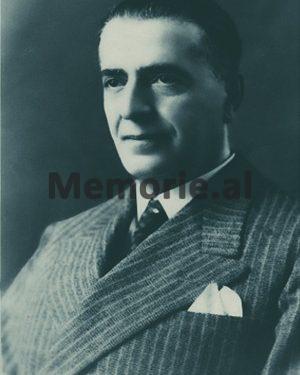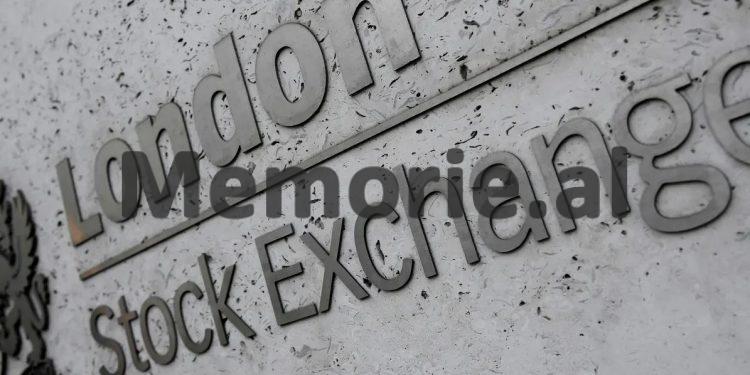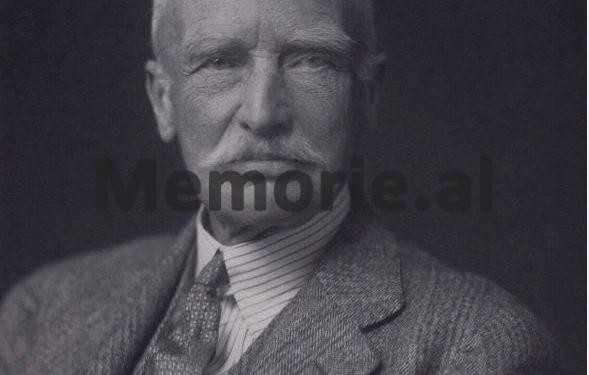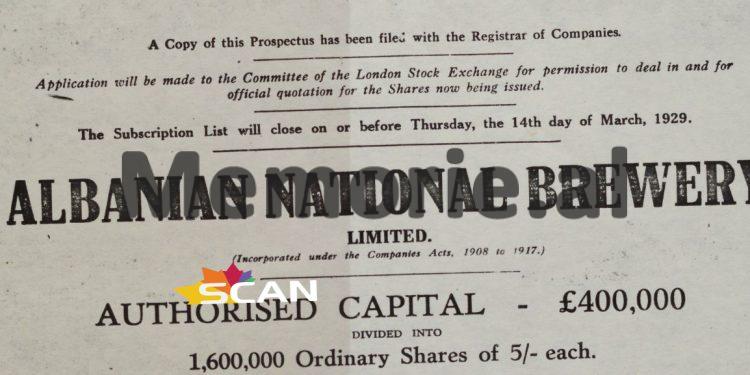By Kreshnik Kucaj
Memorie.al / Although it had been several years since the construction of an economic model, similar to that of the West, had started in the 20s – 30s, various efforts by Albanian traders to undertake daring financial moves and, sometimes even complicated ones, if the time context and development stage of the country is taken into account. At the end of the 20s, the need for financing would make some Albanian traders, in order to save their company, go so far as to list it in the financial center of the world, in the “London Stock Exchange” .
Everything is related to the construction project of a brewery in Shkodër. Entrepreneurship seems like an adventure even for today, however, at the end of the 20s, all the “stones” were moved; political, financial and diplomatic in order to finalize this venture. Everything is related to the first brewery concession, 2 years before the “Korça” brewery concession was approved (1928).
The Kakarriqi brothers and their connection to the world capital of beer
The Albanian Parliament voted on December 26, 1926, the concession for the establishment of a brewery in Shkodër. The company was initially planned to be named “Birra Kakarriqi”, in the name of the beneficiaries with the same surname. Mark Kakarriqi and his brother Tush Kakarriqi, were the beneficiaries of the concession. The Kakarriqi brothers at that time were well-known businessmen in Shkodër and had economic activity in many sectors.
The most well-known among them was Mark Kakarriqi, an economist who was also active in the press of the time, in the debate on the development of the country, and with an important contribution to the national movement.
Kakarriqi cooperated with British investors, but the latter’s strategic interest in Albania of those years would change for many reasons and, as a result, would be reflected in the projects that were on paper.
Meanwhile, the other brother, Tush Kakarriqi, had a long experience in the field of beer production, as a result of the cooperation he had with the biggest beer companies in Germany. It should be remembered that until the creation of the brewery, all beer was imported from abroad, although there could be some small brewery, for minimal consumption.
Tush Kakarriqi had also completed a special technical school in Munich, Germany, where the most famous breweries were, making him the most qualified person to run the brewery.
Project for the first factory
The concession granted to the “Kakarriqi” brewery provided for facilitating conditions and a series of fiscal incentives, which would enable the company to be profitable in a market like Albania. Referring to the agreement, the concessionaire was obliged to start manufacturing beer within 18 months from the date of the announcement of the concession.
The agreement provided for the exemption from the customs tax and other taxes, for all materials and machines for setting up the factory. The government, in order to protect this industry from external competition, was committed to imposing a special tax on imported beer.
Meanwhile, the concessionaire was forced to pay the state a tax of 2.75 gold francs for each hectoliter of beer produced. The export of beer would be allowed, when the concessionaire had completed the quantity required for the country’s consumption.
After a year, an anonymous company was formed, named “Birra Kakarriqi Shkodër”, with a capital of 750 thousand gold francs. Also, the company’s statute was drafted, which was decreed on March 1, 1928.
For various reasons, the company asked several times for an extension of the deadline, which was actually granted by the government. The deadline was extended until January 26, 1931, but the factory was still not set up and put into operation.
Haxhi Shkoza, says that in 1930, “the works for the establishment of a magnificent factory in Shkodër, began with exemplary enthusiasm, they progressed quite a bit, but unfortunately, after a while, they were suspended and for now, all that invested capital seems lost for that purpose”.
The establishment of this factory was also connected with the “fate” of another factory, “Korça Brewery”. The latter was a concession that was granted to an Albanian and an Italian, for a period of 25 years. If “Birra Kakarriqi” were to be established and put into operation in Shkodër, then “Birra Korça” would automatically benefit from a 10-year extension of the concession term.
Attempt to list on the London Stock Exchange
But the most interesting element is that after the first failure, the beer company of Shkodra tried to make a big financial move, which not only aimed to make this factory functional, but also to get to the point of being listed on the stock exchange. London, ‘London Stock Exchange’.
After the first failure of setting up the factory, the Kakarriqi brothers try to engage British capital for its operation. In this way, they established a company that took the rights, over the 99 year concession of the factory.
The newly established company was named “Albanian National Brewery”. This company planned to start production on December 31, 1929, three years after receiving the concession. The concession allowed the company to export to other countries the beer it would produce, above the country’s consumption needs, with zero taxes.
At the time of granting the concession, all beer consumed in Albania came from abroad. Preliminary estimates spoke of an import level ranging from 52,000 to 60,000 hectoliters.
Under these conditions, it was foreseen that apart from production for the domestic market, the factory would also produce for export.
“The geographic location of the factory will place it in a favorable location to meet the demand for beer in Egypt, Greece, Palestine and the northern African Gulf. The facilities of sea transport will place the company in a favorable position to transport beer at low prices and it is expected that in this way, large profits will be secured,” it was written in the documents of the company founded in London.
The company was expected to take possession of an area of 12,000 square meters, in the area of Shkodra, which was considered a strategic point, for the sea transport that would be made to the beer that was produced. Also, this area provided access to drinking water that was chemically considered by experts to be similar to the water used for brewing beer in Munich, Germany, where the beer was famous.
The project to mobilize British investment envisaged the engagement of another company, which had modeled and remodeled 250 breweries in England and other countries.
It was envisaged that the factory would create its warehouses in the ports of Shkodra, Durrës and Shengjin and warehouses in the main cities, such as; Tirana, Shijak, Krujë, Kavajë, Durrës, Elbasan, Përmet, Berat, Gjirokastër, Lushnje, Vlorë, Sarandë, Korçë and Pogradec. In these cities, transportation would be by motorized carriage. In the meantime, it was foreseen that in the big cities, bottling factories would be set up with the aim of final consumption among the population.
A “British Sir” for running the company
Harry Eyres, the famous ex-ambassador of Britain in Albania, was proposed as the director of the company. “He is a personal friend of the King of Albania and is universally respected in the country and has a good knowledge of the country and local traditions,” the company’s founding document reads.
It was also envisaged that Mark Kakarriqi, founder and beneficiary of the concession, would serve as managing director. Only from the sale in the local market, it was calculated that the company would have an income of no less than 94 thousand pounds.
Applications for shares in the beer company were to be made to Lloyd Bank in London, while the company’s registered office was expected to be in England. The company’s capital was expected to be £400,000 and the company would have 800,000 ordinary shares.
The company was expected to be listed on the London Stock Exchange, while four well-known brokerage companies were contracted, two based in London, one in Liverpool and one in Manchester. ‘Baily, Mercer Karo’, ‘Charlesworth Bennett & Co’, ‘Chrichton Bros & Toënley’ and ‘Halliday & Teasdale’.
In fact, the London Stock Exchange crashed in September 1929, along with Wall Street, signaling the start of what is known as the Great Depression.
Later developments would mean that the project would not be finalized even this time and the company would not be able to raise the required capital. After this failure, the company was involved in a series of lawsuits, which would continue even after the Second World War.
However, this company can be considered as one of the first Albanian companies that attempted to be listed on one of the most famous stock exchanges in the world, leaving an important mark in the modern financial history of Albania. Memorie.al














